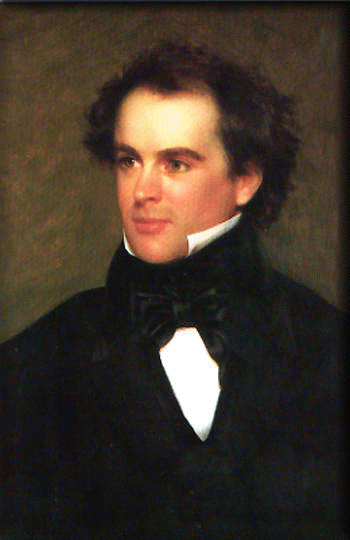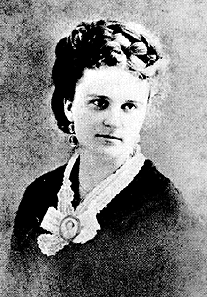
"One can smile, and smile, and be a villain."
Hamlet
The political and literary parallels between Nathaniel Hawthorne (1804-1864) and Barack Obama are uncanny. Okay, perhaps I exaggerate. But I have been reading the former's short stories and the latter's Dreams From My Father, and they both tempt and test my ability to connect seemingly disparate characters. For one thing, the moral hazards of Hawthorne's fictions, no less than the pre-Election Day dread of some appalling Republican upset, demonstrate that there are far worse things to fear than goblins this Halloween.
Literary Hawthorne and political Obama strive to overcome two related bugbears: alienated apartness on the one hand and radical distrust on the other. And Hawthorne was more political than most fiction writers, while Obama is more genuinely a writer than most politicians. Both explore the dark regions of the soul, although Obama has had to suppress this inclination in favor of "sweetness and light" for the general election.
Compared to the very dark materials of his fictions, and compared with some of his famously eccentric contemporaries--Poe, Dickinson, Thoreau--Hawthorne was outwardly conventional, happily married and raising three children. He got into politics by penning a campaign biography of his college friend Franklin Pierce, who unfortunately turned out to be one of the worst presidents ever. Pierce was followed by James Buchanan, who was apparently just as bad, but Lincoln came next. If history were to repeat itself, we would have to endure another mediocrity before getting someone exceptional. Hmmm...
For Hawthorne isolation is both blessing and curse, the progenitor of both creativity and suffering. In a preface he wrote of his early years: "I sat down by the wayside of life, like a man under enchantment, and a shrubbery sprung up around me, and the bushes grew to be saplings, and the saplings became trees, until no exit appeared possible, through the entangling depths of my obscurity."
This may sound somehow magical and comforting, almost uterine. But at the end of "Wakefield," a disturbing story about a man's escape from domestic life, we read: "Amid the seeming confusion of our mysterious world, individuals are so nicely adjusted to a system, and systems to one another, and to a whole, that, by stepping aside for a moment, a man exposes himself to a fearful risk of losing his place forever. Like Wakefield, he may become, as it were, the Outcast of the Universe." For Hawthorne, human solidarity is so precarious that even momentary inattention or carelessness can send one spinning into the void, as it were.
Another anathema for Hawthorne's protagonists, yet always a temptation, is the prideful manipulation of humanity. This is termed the Unpardonable Sin in "Ethan Brand," and manifests itself as an overweening impatience with human imperfection in "The Birthmark." A witch seems to mock human beings by animating a scarecrow in "Feathertop," while magic fails to overcome human folly in "Dr. Heidegger's Experiment."
But reconciliation with the human race does not come easily in Hawthorne. The reason is the corrosive human propensity for iniquity and deception. The protagonist of "Young Goodman Brown" is devastated to learn the secret lives of those he previously put trust in, while "The Minister's Black Veil" is Junior High symbolism for hypocrisy. For Hawthorne as for Hamlet, the real zinger is not the fact of Evil itself, but the fact that it can hide so effectively from sight. The isolated individual withers, while solidarity is threatening.
The first part of Obama's Dreams From My Father eloquently yet without self-pity describes his childhood dismay at having to straddle black and white cultures (actually "brown" as well as the book puts it, with respect to the time he lived in Indonesia). He came to know alienation intimately. He tried to overcome this in part in his years as a community organizer in Chicago, but he was brought up short again and again by the brutal realities of human oppression, complacency, and corruption. It is the same "can't live with them, can't live without them" quandary.
In one telling dialogue, Obama describes his half-sister, Auma, expressing her dislike of politics. The reason? "People always end up disappointed" (p. 209). To me, this captures the fundamental political dilemma. In politics one is thrown together with others who may have radically different value systems and different points of view, and yet some kind of workable coexistence, or even better, consensus must be reached. One must overcome both alienation and distrust, and to my mind it is one of the harder things we attempt to do. Obama's story is a willed perseverance through both psychological and cultural obstacles in an attempt to reconcile with a society that he had every reason to be at war with. McCain's military courage and sense of honor are admirable, but Obama exhibits a moral resilience that originates in murkier psychological regions. Happy Halloween, and here's hoping for an illuminating Election Day and dispersal of our recent gloom.
















